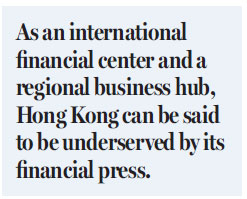City's financial press fails to deliver the expected value
Updated: 2017-10-06 08:07
(HK Edition)
|
|||||||
When the market is good, every media boss in Hong Kong is thinking of expanding financial coverage. It's really the cheapest and least demanding thing to do for a television station or a newspaper.
And so, every morning, most of the television channels have similar programs that are supposed to tell viewers how to make money or avoid losing it. The problem, of course, is that they are all the same, with the usual cast of analysts and commentators saying things that are mostly obvious to the average investors.
In this internet age when the traditional media doesn't have a clue of what to do to survive, they are clinging for dear life onto financial news as the fit-all live saver. Television Broadcast, the dominant television station in town, has just devoted one channel to all day financial news. The new owner of Cable TV told reporters that the focus of the station would be shifted to, yes, financial reporting.
Financial news has always had a market in this business-oriented town. The demand for market information has become increasingly keen after the surge in property and stock prices in the past many months, drawing in more and more people into the money game.
With asset prices hovering at the current lofty levels, the threat of a sharp correction that could be triggered by some unexpected financial hiccups in Hong Kong or elsewhere is keenly felt by investors. Unsurprisingly, they are closely watching the news for clues of what can hit the value of their investments.
The problem is that hardly any financial news providers in Hong Kong seem to have found the formula for success. What viewers get from the various financial programs is nothing more than the rehash of analysts' reports from stockbrokers and investment banks which were already circulated among their clients. By the time the viewers get this information from TV programs, it is already old news.

Of course, nobody should expect to hear some detailed analysis of stock market trends of individual companies' performances in talk shows. The usual contingent of guests invited to appear in the financial programs seem more concerned about possible lawsuits for the wrong advice than in actually giving advice. Overladen by qualifiers and muddling, their remarks are hard to understand and practically useless.
Hong Kong used to have a very lively and highly competitive financial press. It was common to see young reporters challenging the banking moguls, real estate tycoons and merchant princes on what they said at press conferences and open forums. Information was harder to come by in those days than it is now. But everybody, including editors and reporters, worked harder to dig up the dirt.
Now, what readers see in the business sections of most publications are basically reprints of company's statements, laced with some superficial comments from the usual sources, mostly unnamed. In recent years, readers were served the daily diet of reports on how many people lined up to buy apartments of this or that projects, or the extravagant excesses of the business celebrities.
Financial reporters are either too inexperienced or shy to question some of the outlandish and self-contradicting claims of business tycoons. For instance, property developers and their agents were saying at one time property prices in Hong Kong could only go up because of rising demand supported by persistent low interest rates and plentiful supply of credit. Now that interest rates are set to go up and global credit growth is restrained by the winding down of the US Federal Reserve's balance sheet, you'd expect that they will be singing a different tune.
But instead of calling for caution, as some financial officials have done, the very same developers and property agents are now saying that the removal of market uncertainties will help further boost asset prices. As they talk, stock prices plunged on concern about a possible liquidity squeeze by the expected interest rate rise in the US in December and the strengthening of the US dollar that could lead to an outflow of capital from Hong Kong.
As an international financial center and a regional business hub, Hong Kong can be said to be underserved by its financial press. It really isn't cheap or simple to produce financial news that readers or viewers find useful in making investment decisions.
The author is a current affairs commentator.
(HK Edition 10/06/2017 page5)